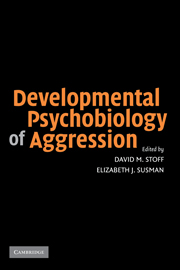12 - Synthesis and Reconsiderations of the Psychobiology of Aggressive Behavior: A Conclusion
Published online by Cambridge University Press: 14 July 2009
Summary
INTRODUCTION
The expression that time changes everything could be no more true than in the case of the integration of human biology and aggressive behavior. Earlier perspectives concerning the integration of biology and behavior were riddled with ideas of determinism and the preponderance of nature over nurture. Biological processes were viewed as causal agents in behavior. Current perspectives view biology and behavior as evolving in dynamic interaction throughout ontogeny (Lerner, 2002; Magnusson, 1999; Magnusson & Stattin, 1998; Susman, Dorn, & Schiefelbein, 2003; Susman & Rogol, 2004). These perspectives suggest that levels of existence, from the molecular and genetic to the macro social levels, co-dependently produce the uniqueness of individuals.
The chapters in this volume attest to how the decline in the perennial debate about nature and nurture has facilitated the acceptance of new theoretical and empirical developments on biological parameters of aggressive behavior. First, the chapters show that explaining a complex human behavior, such as aggression, now is not the purview of any one disciplinary perspective. Throughout the history of the study of development, philosophers and scientists have been devotees of either a biological or a social perspective on the causes of aggressive and criminal behavior. In the past few decades, a clear distinction existed between biological, behavioral, and social science perspectives on aggression. The prevailing view was that biologists search for universals to explain human behavior and differences among species. In contrast, behavioral and social scientists focus on social processes and search for individual differences among persons.
Information
- Type
- Chapter
- Information
- Developmental Psychobiology of Aggression , pp. 271 - 290Publisher: Cambridge University PressPrint publication year: 2005
References
Accessibility standard: Unknown
- 3
- Cited by
